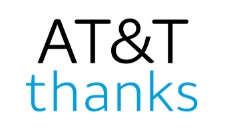Citi has offered ThankYou Rewards for many years. Although it means different things for different cardmembers, and has been revamped several times.
- When first introduced in 2004 they would buy you a ticket that met specific restrictions. Then they introduced points with a fixed value. Then they devalued in 2009, no longer allowing redemption of premium cabin tickets at a better rate per point than coach. Then they introduced transferrable points in 2014.
- However only premium cards offer the ability to transfer points to miles.
- Banking product points cannot be transferred to miles at all.
So I’m not sure how well-established a brand there is for the name, and whether consumers identify the name with a clear value proposition.
AT&T is launching a new program, AT&T thanks.

And Citibank is suing for trademark infringement because “Citigroup’s THANKYOU Marks are widely recognized by the general consuming public as a designation of source for Citigroup’s high quality financial services and customer loyalty, reward, incentive, and redemption programs.”
We learn from the suit that “[a]pproximately 7 million customers have THANKYOU-branded credit cards.” Ironically that includes the AT&T credit card which is issued by Citi. There are about 1.7 million Citi AT&T credit card holders.
Citi insists in their lawsuit (.pdf) against AT&T that they have “not consented to or authorized Defendants to use the “thanks”
Citi launched their first iteration of ThankYou Rewards in 2004, and ThanksAgain because a consumer-facing program shortly after that.
Citi issues Hilton co-brand credit cards (albeit not cards that earn ThankYou points), and Hilton has offered discounts under the Thank You Rate.

Citi co-brand partner American Airlines AAdvantage sent out a Thank You greeting one year for the holidays. AAdvantage also said thank you to members for voting it Best Elite Program in the Freddie Awards this year. And they even gave away prizes under the banner ‘thank you’ for chilling out with us.
And AT&T didn’t even say Thank You… just thanks.
I’m not a trademark attorney, and I know that several of my readers are. However use of the terms “thank you” and “thanks” especially in relation to commercial transactions and loyalty are common and in long-standing use.
Citi’s trademarks are all specific to the words ThankYou without a space between them, and for “promoting the goods and services of others,” for “credit card services” and for “providing gift cards and stored value pre-paid card services.”
It’s hard to imagine — even with a co-brand card relationship between the two companies — that Citi could plausibly claim use over AT&T’s (or anyone else’s) use of “thanks” not in direct competition with Citi’s own offering. Saying thanks does not cause consumers to believe they are being thanked by Citibank!
Even the song “Happy Birthday” is set to enter the public domain. It’s time for saying thank you to be encouraged rather than restricted by law.
(HT: Alex Tabarrok)


They should file a lawsuit agains the bags they give at supermarkets that say: “thank you” with the smiley face!!!!! I only know the work thankyou from citi they are the one who introduced us to thanking! No one ever before used that word, it is a very unique trademark. They should trademark Hello too.
That’s an interesting one, and I actually think the suit has some merit.
The issue isn’t whether AT&T (or anyone else) can use “thanks” to express gratitude (or any other sentiment) to their customers. Registered marks often consist of common English words or phrases, but that doesn’t mean that the rest of the world is prohibited from using those words or phrases to express their plain meaning.
The issue is whether a competitor can use the registered mark as a source-identifying brand for a similar product or service, and the answer depends on whether a reasonable consumer would believe that there is some affiliation or connection between AT&T and Citi’s programs. If so, it’s infringement; if not, it’s not. It’s a tough question and, like all trademark infringement claims, it’s a highly factual inquiry that will be hashed out with competing surveys of likely consumers.
That’s my two cents.
Dits on David’s comment.
Basically, Citi starts a trademarked banking rewards program called ThankYou. A decade later, ATT, a Citi partner, begins their own rewards program called Thanks (or, THANKS, I’m not sure which).
Yeah, that *might* be confusing.
The only thing that’s really surprising here is that this went public. There were plenty of opportunities for somebody to step up and say, “hey, guys, are we sure we want to do this?”
As a technical legal matter I assume Citi wouldn’t file the suit against their partner unless they had a leg to stand on.
My point to this post, which I didn’t think needed to be spelled out, is that a trademark system that allows a business to claim “thanks” is on its face absurd. The post is a statement about trademark law, more than Citi/AT&T…
ThankYou for this post Gary.
Oh man, now I’ve done it…
David, above is correct, although I am reminded of Qualitex Co. v. Jacobson Products Co., 514 U.S. 159 (1995) where SCOTUS indicated that if the range of marks (like words like “thank you” in the loyalty industry) is limited they may be so prone to depletion that no one should be afforded exclusive use of any given one.
Gary, my apologies for forcing you to spell out the point of your post.
But now that you have, your point misses the mark. I think what you’re trying to express is that the law shouldn’t permit a company to register a generic term, i.e. a term that is synonymous with the type of product to which the term is applied. And that’s actually correct — so, for instance, Pepperidge Farm cannot register the term “COOKIE” and preclude other companies from using that term to describe their own cookies.
Where your point goes awry is the implicit assumption that “ThankYou” is a generic term. It’s not. It’s suggestive, or perhaps descriptive, but it’s clearly not generic. There are some fairly nuanced rules that govern whether a company can register a suggestive or descriptive mark, and I’d encourage you to read up on them so you don’t seem like such an ignoramus the next time you’re forced to explain such self evident “points” to your readers.
And hey, don’t be so cranky. I know AA is going revenue-based, but no need to insult the intelligence of your readers.
@David I think we’re we diverge is an is vs ought distinction. Telling me to read up on the law isn’t responsive to a suggestion that those laws should be different. In any case, my point is that any system that allows “thankyou” to extend to “thanks” is excessively overbroad and absurd. That’s my view, and replying with how the rules work underscores my point it does not rebut the point.
So I think this is bad news for those considering signing up for that Citi ATT Access More card huh?